
Derek Bailey was an English avant-garde guitarist and an important figure in the free improvisation movement. Bailey abandoned conventional performance techniques found in jazz, exploring atonality, noise, and whatever unusual sounds he could produce with the guitar. Much of his work was released on his own label Incus Records. In addition to solo work, Bailey collaborated frequently with other musicians and recorded with collectives such as Spontaneous Music Ensemble and Company.

Barry John Guy is an English composer and double bass player. His range of interests encompasses early music, contemporary composition, jazz and improvisation, and he has worked with a wide variety of orchestras in the UK and Europe. He studied at the Guildhall School of Music under Buxton Orr, and later taught there.

Paul William Rutherford was an English free improvising trombonist.

The trombone is a musical instrument from the brass instrument family. Trombone's first premiere in jazz was with Dixieland jazz as a supporting role within the Dixie Group. This role later grew into the spotlight as players such as J.J. Johnson and Jack Teagarden began to experiment more with the instrument, finding that it can fill in roles along with the saxophone and trumpet in bebop. The trombone has since grown to be featured in standard big band group setups with 3 to 5 trombones depending on the arrangement. A person who plays the trombone is called a trombone player or a trombonist.
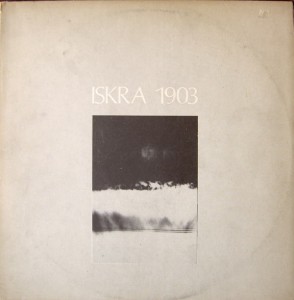
Iskra 1903 is the debut album by the group of the same name, featuring trombonist Paul Rutherford, guitarist Derek Bailey and bassist Barry Guy which was recorded at the Institute of Contemporary Arts in 1970 and in a studio in 1972 and first released as a double album on the Incus label then as a triple CD box set entitled Chapter One 1970-1972 on Emanem in 2000 with additional material.

Collective Calls (Urban) , subtitled "an improvised urban psychodrama in eight parts", is an album by saxophonist Evan Parker and drummer Paul Lytton. It was recorded in April 1972 at the Standard Essence Co, a small loft space in London, and was released later that year by Incus Records. The album was reissued on CD by Psi Records in 2002.

At the Unity Theatre is a live album by saxophonist Evan Parker and drummer Paul Lytton. It was recorded in January 1975 at the Unity Theatre in London, and was released later that year by Incus Records. The album was reissued on CD, with three extra tracks, by Psi Records in 2003.

Blown Bone is an album by trombonist Roswell Rudd. It was recorded in March 1976 at Blue Rock Studios in New York City, and was released on LP by Philips Japan in 1979. On the album, Rudd is joined by clarinetist Kenny Davern, saxophonists Steve Lacy and Tyrone Washington, trumpeter Enrico Rava, vocalist Sheila Jordan, pianist Patti Bown, guitarist and vocalist Louisiana Red, bassist Wilbur Little, and drummers Jordan Steckel and Paul Motian. The album was reissued on CD by Emanem Records in 2006 with a different track sequence, and with an additional track recorded in 1967 featuring another ensemble.
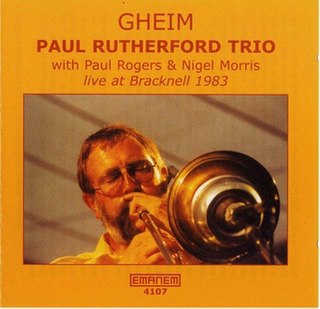
Gheim is an album by trombonist Paul Rutherford and his trio, featuring bassist Paul Rogers and drummer Nigel Morris. The first two tracks were recorded live at the Bracknell Jazz Festival on July 2, 1983, and were originally released by the Ogun label in 1986 on a cassette titled Bracknell '83. In 2004, Emanem Records reissued the live tracks, along with three tracks that were recorded in a London studio on December 12, 1983, on a CD titled Gheim. The disc, with all five tracks, was reissued by Emanem in 2014.
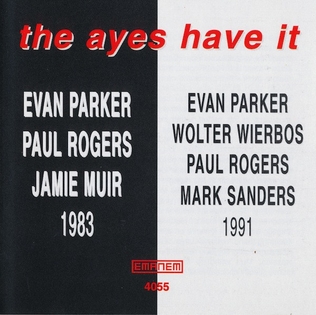
The Ayes Have It is an album by saxophonist Evan Parker. Tracks 1–4 were recorded in a London studio during December 1983, and feature Parker with bassist Paul Rogers, and, in a rare recorded appearance, percussionist Jamie Muir. The remaining track was recorded live at the Angel and Crown pub in London on August 1, 1991, and features Parker, Rogers, trombonist Wolter Wierbos, and percussionist Mark Sanders. The album was released by Emanem Records in 2001.
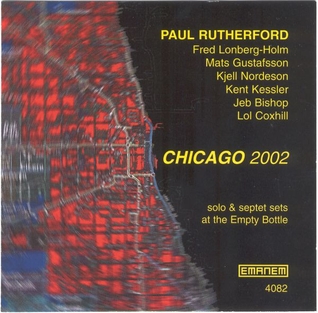
Chicago 2002 is a live album by trombonist Paul Rutherford. It was recorded on April 26 and 27, 2002, at The Empty Bottle in Chicago, and was released later that year by Emanem Records. The album features an extended Rutherford solo followed by three tracks on which he is joined by saxophonists Lol Coxhill and Mats Gustafsson, trombonist Jeb Bishop, cellist Fred Lonberg-Holm, bassist Kent Kessler, and percussionist Kjell Nordeson.

Trombolenium: Solo Trombone Improvisations 1986–1995 is a live solo album by trombonist Paul Rutherford. It was recorded at various concerts in London and Noci, Italy, during 1986, 1992, 1993, and 1995, and was released in 2002 by Emanem Records.

Hoxha is a live album by the free improvisation group of the same name, featuring trombonist Paul Rutherford, saxophonist Ken Vandermark, bassist Torsten Müller, and drummer Dylan van der Schyff. It was recorded on December 12, 2004, in Portland, Oregon, and was released in 2005 by the Spool label as part of their Line series.
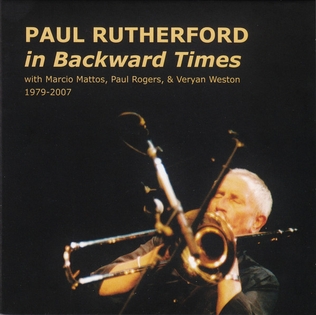
In Backward Times is a live album by trombonist Paul Rutherford. Drawn from archival tapes, it was recorded in 1979, 1988, 2004, and 2007, in Milano, London, and Brussels, and was released in 2017 by Emanem Records. On track 1, Rutherford is accompanied by live electronics, while track 2 is a duet with bassist Paul Rogers. Track 3 is a solo performance, and track 4 is a trio setting featuring cellist Marcio Mattos and pianist Veryan Weston. The final track was recorded roughly three months before Rutherford's death, and documents his last public performance.

Neuph: Compositions for Euphonium and Trombone is a solo album by trombonist and euphonium player Paul Rutherford. In its original version, released on LP by the Sweet Folk and Country label in 1978, it consisted of seven tracks that were recorded on January 30 and 31, 1978, at Mid Wales Sound Studios in Castle Caereinion, Wales, UK. In 2005, it was reissued on CD by Emanem Records with two additional tracks that were recorded live in April and June 1980 in Rome and Pisa, Italy. Most of the tracks involve overdubbing, and one track features a duet with a dog named Judy.

Solo in Berlin 1975 is a live solo trombone album by Paul Rutherford. Four tracks were recorded at the FMP Workshop Freie Musik at the Akademie der Künste in Berlin on March 31, 1975, while the remaining tracks were recorded at the FMP Total Music Meeting at Quartier Latin in Berlin on November 7 and 8, 1975. The album was released in 2007 by Emanem Records
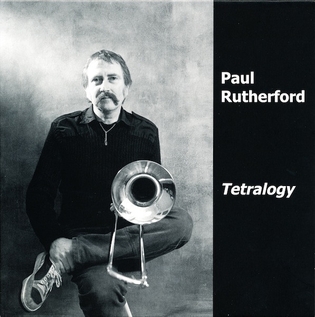
Tetralogy is a two-CD live album by trombonist Paul Rutherford. Drawn from archival tapes, it was recorded in 1978, 1981, and 1982, in London and Pisa, and was released in 2009 by Emanem Records. The album presents Rutherford in a variety of contexts: two solos, one with electronics, and one without; a brass quartet that features trombonist George E. Lewis, French hornist Martin Mayes, and tubist Melvyn Poore; and a trio with bassist Paul Rogers and drummer Nigel Morris.

The First Full Turn is a live album by the free improvisation group known as RoTToR, featuring trombonist Paul Rutherford, vocalist Julie Tippett, pianist Keith Tippett, and bassist Paul Rogers. The bulk of the album, a long quartet track, was recorded on April 30, 1998, at Theatre P Scarron in Le Mans, France. A remaining solo trombone track was recorded on February 6, 1998, at St Giles Cripplegate in London. The album was released by Emanem Records later that year.

Rogues is a live album by trombonist Paul Rutherford and bassist Paul Rogers. Featuring two duets plus a solo for each musician, it was recorded on November 11, 1988, at the Cannonball, a pub in Birmingham, England, and was released in 1996 by Emanem Records.

Sequences 72 & 73 is an album by trombonist Paul Rutherford and the group known as Iskra 1912. It was recorded during 1972–1974 in London, and was released in 1997 by Emanem Records. The album features studio recordings of two ensemble works composed and conducted by Rutherford, plus a live recording of a solo trombone piece.




















